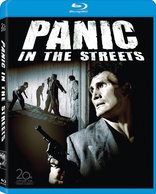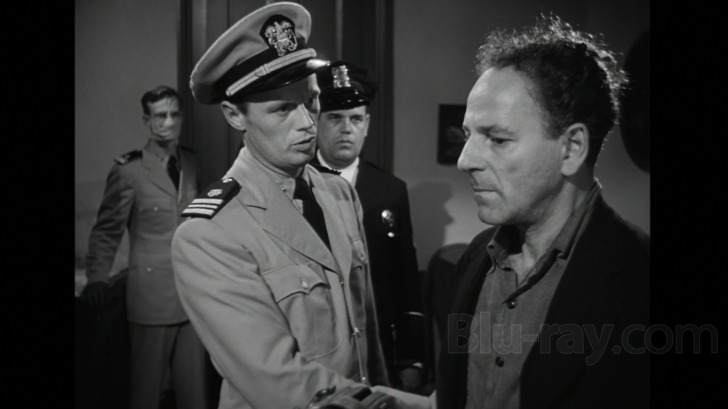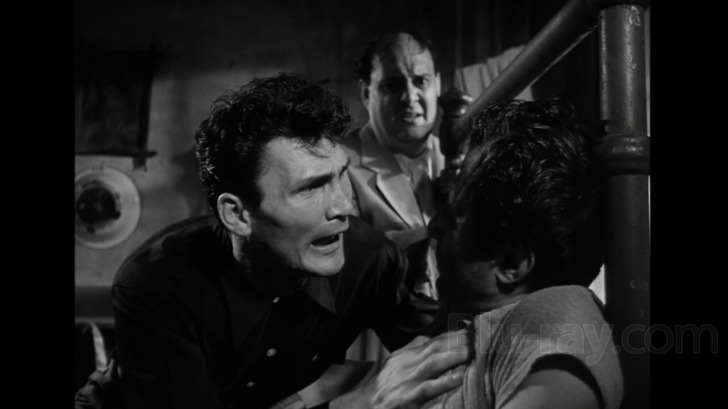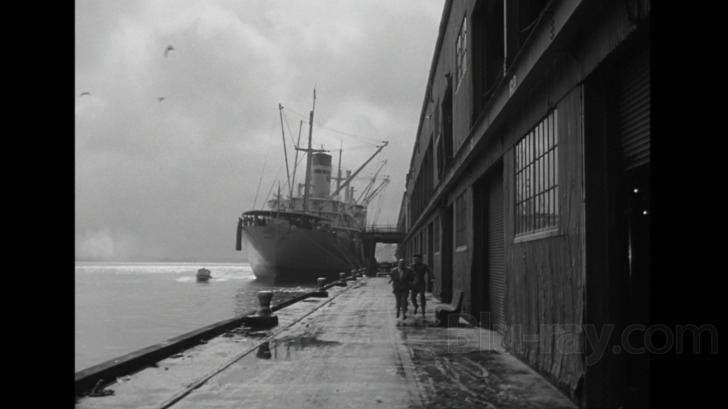Panic in the Streets Blu-ray Movie
HomePanic in the Streets Blu-ray Movie 
Fox Studio Classics20th Century Fox | 1950 | 96 min | Not rated | Mar 26, 2013

Movie rating
7.1 | / 10 |
Blu-ray rating
| Users | 0.0 | |
| Reviewer | 4.0 | |
| Overall | 4.0 |
Overview
Panic in the Streets (1950)
A doctor and a policeman in New Orleans have only 48 hours to locate a killer infected with pneumonic plague.
Starring: Richard Widmark, Paul Douglas (I), Barbara Bel Geddes, Jack Palance, Zero MostelDirector: Elia Kazan
| Film-Noir | Uncertain |
| Thriller | Uncertain |
| Crime | Uncertain |
| Drama | Uncertain |
Specifications
Video
Video codec: MPEG-4 AVC
Video resolution: 1080p
Aspect ratio: 1.41:1
Original aspect ratio: 1.37:1
Audio
English: DTS-HD Master Audio 2.0 Mono (48kHz, 24-bit)
Subtitles
English SDH, French, Spanish
Discs
25GB Blu-ray Disc
Single disc (1 BD)
Playback
Region free
Review
Rating summary
| Movie | 4.0 | |
| Video | 4.0 | |
| Audio | 4.0 | |
| Extras | 3.5 | |
| Overall | 4.0 |
Panic in the Streets Blu-ray Movie Review
Will life ever be sane again?
Reviewed by Casey Broadwater March 29, 2013Four years before his heavyweight union drama On the Waterfront, director Elia Kazan made an entirely different kind of film set down by the docks. 1950's Panic in the Streets is one part cops 'n criminals mystery and one part disease outbreak thriller, a gritty—and underrated—little noir that may lack the Big Issue social consciousness of Kazan's most famous films, but is a sterling example of the director's command of tone, pacing, and mise-en-scene. Shot on location in New Orleans, Panic in the Streets shows Kazan transitioning from his earlier, theater-style staging to an almost documentarian realism—authentic settings, authentic non-actor extras, long fly-on-the-wall takes—albeit dramatically heightened with the moody black and white cinematography typical of post-war noir. Given its keen balance of human relational elements and procedural genre conventions, it wouldn't be surprising if Steven Soderbergh studied the film before making 2011's Contagion, which seems like a direct cinematic descendant, both featuring smart professionals struggling to do their jobs while contending with bureaucratic resistance and the stress of their personal lives.

The film's open is all cold-blooded gangster unease. Feeling feverish, straight-off-the-boat illegal Armenian immigrant Kochak (Charles Lewis) ducks early out of a poker game with the small-time crook and money launderer Blackie (Jack Palance), who's eager to get his losings back. In a long, uncut shot, Blackie and his thugs—the badly comb-overed Raymond (Zero Mostel) and the nervous Poldi (Guy Thomajan), the immigrant's cousin—track Kochak as he staggers across a set of train tracks and up to a warehouse, where they gun him down after he pulls a knife. The next morning, the police find the body dumped in the harbor. Coroner Kleber (George Ehmig) foresees a simple autopsy on the John Doe—there's a great scene where he casually discusses lunch plans with a colleague while prepping to examine the corpse—but when he finds evidence of an unidentifiable pathogen, he calls in the local expert, Lt. Cmdr. Clint Reed (Richard Widmark), a doctor in the Navy's health services division.
The criminal shadiness of Blackie's underworld is quickly contrasted with the workaday domesticity of Reed's life. He's introduced painting a cabinet with his young son, and he's none too happy about getting the call from the coroner on his first day off in six weeks. Before he leaves, his wife, Nancy (Barbara Bel Geddes), gently bugs him about a bill that needs paid, and this short scene gives us an instant snapshot of their marriage as a whole— loving but strained, middle class but still struggling. Down at the morgue, Reed makes the startling discovery that the victim, had he not been shot, would've died in twelve hours from highly contagious pneumonic plague. He immediately has the body cremated, inoculates everyone who came in contact with it, and sets up a meeting with the mayor and various city officials, who don't want to believe him but do understand the seriousness of the potential outbreak. Reed's most vocal opponent is Captain Warren (Paul Douglas), an older police detective wary of the doctor's "college boy" methods. The two butt heads but are forced to work with one another to track down leads before the disease begins to spread uncontrollably.
Panic in the Streets is a bit of a misnomer, since the public at large—despite the snooping of a local reporter (Dan Riss) keen to break the story —is kept in the dark about the deadly contagion. But I guess that's a better title than Potential for Panic in the Streets. Regardless, the film is genuinely tense as Reed spends sleepless days and nights questioning seamen and restauranteurs, bending the stubborn Warren's arm, and making Sherlock Holmes-style inferences to get him closer to those who were in contact with "patient zero." Occasionally, the film's perspective switches to follow Blackie, who thinks the whole hubbub about Kolchak has to do with something the illegal smuggled into the country. Of course, Blackie is partially right, he just doesn't realize that this something was an infectious disease that he himself might now have.
Dramatic irony is the name of the game here—we know everything long before the characters do—so the particular pleasure of Panic in the Streets is in seeing how wonderfully it all comes together. This is a tightly plotted film made with impeccable craft and style, from Richard Murphy's script—which is both emotionally nuanced and vivid with the details of professionals doing their jobs well—to the slow rhythms of the editing, generating suspense through often unexpectedly long takes. Shooting in dive bars and coffee factories and crowded shipyards, Kazan captures the seamier, less celebrated side of New Orleans as a working class industrial hub. The only concession to the usual portrayals of Louisiana is Alfred Newman's jazz-infused score, which drifts in and out of buildings and lends a sort of swampy musical humidity to the already dense black and white visuals.
Audiences who remembered Richard Widmark for his screen debut as the maniacal psychopath Tommy Udo in 1947's Kiss of Death may have been surprised to see him as the good guy here, but even his Dr. Reed has an edge, visible in his mild annoyance with his wife or the way he blows up at those who don't see the severity of the situation at hand. The film's other notable performance is from Jack Palance, who made his own first-time film appearance as Blackie, projecting menace and charisma in equal measure.
Panic in the Streets Blu-ray Movie, Video Quality 

While not the best available transfer of an Elia Kazan film on Blu-ray—that honor goes to Criterion's simply perfect treatment of On the Waterfront—Panic in the Streets boasts a 1080p/AVC-encoded presentation that's far better than the movie has ever looked on home video. Barring a few errant white specks and one or two instances of light flickering, the print is in impeccable condition, with no overt scratches, hairs, or larger bits of debris. Always important for a black and white film, the contrast balance is also excellent; much of the film takes place at night, so it's crucial that blacks don't crush shadow detail—they don't—while highlights remain crisp but never overblown. My lone reservation is that the image seems a little soft. Don't get me wrong; there's no doubt you're looking at a high definition picture, with increased detail in facial features and wool suits and hair, but I suspect the picture could be sharper. The culprit here—and I might be wrong—is the ever-so-slight attenuation of film grain. This is no DNR disaster, but it looks to me like there has been some smoothing, resulting in grain that sometimes looks more patchy than consistent and full-bodied. This is a minor complaint, though, and from a normal viewing distance it doesn't even visually register. Don't Panic in the Streets— the film, for the most part, looks wonderful.
Panic in the Streets Blu-ray Movie, Audio Quality 

Fox's Blu-ray release features a lossless DTS-HD Master Audio mono track that suits the film just fine. There are no pops, crackles, hisses, or thumps here, and the mix has a decent sense of dynamic heft for a movie of this vintage, with none of the tinniness you sometimes expect from mid-century sound design. Alfred Newman's score, in particular, sounds wonderful, with big brassy horns in the intro that fade into slinkier jazz for the remainder of the film. Most crucially, dialogue is always easy to understand. No issues here whatsoever. The disc includes optional English SDH, Spanish, and French subtitles in crisp white lettering.
Panic in the Streets Blu-ray Movie, Special Features and Extras 

- Audio Commentary: Film historians Alain Silver and James Ursini put the film in its historical context, give some critical analysis, and offer details on the careers of just about everyone involved. A good listen.
- Jack Palance: From Grit to Grace (SD, 44:10): A made-for-TV special on Palance's life and career, from his humble beginnings as a coal miner's son to his lasting Hollywood legacy. Features interviews with Billy Crystal, Kiefer Sutherland, and many more.
- Richard Widmark: Strength of Characters (SD, 44:13): Likewise, a profile of Widmark. The most interesting revelation here is that he went with a friend to Germany shortly before the start of WWII—just to see what all the political fuss was about—and ended up getting permission to tour and film Nazi youth camps.
- Theatrical Trailer (HD, 2:12)
Panic in the Streets Blu-ray Movie, Overall Score and Recommendation 

One of Elia Kazan's most overlooked films—perhaps because it lacks the social significance of his best-known works—Panic in the Streets is an engaging epidemic thriller with noir overtones, shot on location in New Orleans' grimier quarters. If it's not quite as frantic as its title suggests, the film is about as tightly made as a movie can be, with excellent camerawork, fine performances, and a story that balances the professional and personal. It's well worth your time if you're interested in film noir or classic Hollywood genre pictures in general. 20th Century Fox's Blu-ray release does the movie justice—the included audio commentary is especially recommended—so I see no reason not to pick this one up and pass it around to your friends like a cold.
Other editions
Panic in the Streets: Other Editions
Similar titles
Similar titles you might also like

Side Street
Warner Archive Collection
1949

The Killer That Stalked New York
1950

The Shadow on the Window
1957

Mystery Street
Warner Archive Collection
1950

On Dangerous Ground
Warner Archive Collection
1951

The Enforcer
1951

Shield for Murder
1954

Union Station
1950

While the City Sleeps
1956

The Chase
1946

Private Hell 36
1954

Cause for Alarm!
1951

Impact
Collector's Edition
1949

High Sierra
1941

Heaven's Prisoners
1996

Hidden Fear
1957

Thunder Road
1958

Phantom Lady
1944

Boomerang
1947

Crime of Passion
1957
